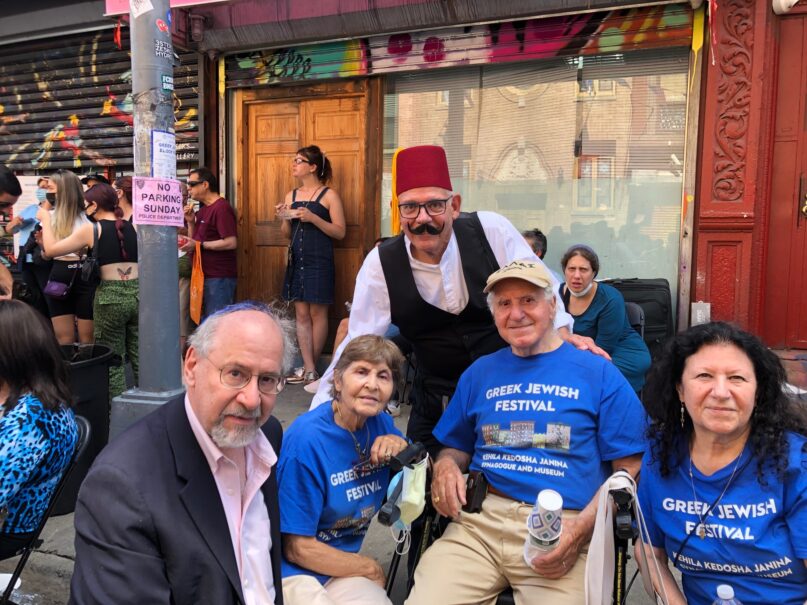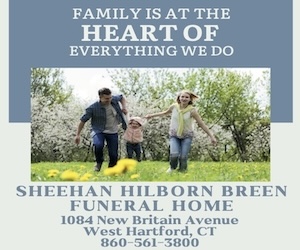
By Stacey Dresner
NEW HAVEN – This past February, Rabbi Alvin Wainhaus was among those gathered at the Jewish Museum in New York to hear Pfizer CEO Dr. Albert Bourla recount his parents’ experience as Jews living in Greece during the Holocaust.
It was then the spiritual leader of Congregation Or Sholom in Orange learned about Archbishop Damaskinos Papandreou, who was responsible for saving thousands of Jews in Athens during World War II. Wainhaus knew in an instant that the late archbishop had to be honoree at the community’s Kristallnacht commemoration, an event the rabbi has organized every November for the past 15 years.
The commemoration will be held on Sunday morning, Nov. 14 at 9 a.m.
The event, held on Zoom for the second year in a row owing to the pandemic, is presented by Or Shalom in partnership with the Jewish Federation of Greater New Haven and with support by the American Society for Yad Vashem.
Kristallnacht took place on Nov. 9 and 10, 1938. Regarded as the prelude to the Holocaust, the horrific attack on European Jews happened over the span of more than 48 hours, when mobs rampaged across Nazi Germany, Austria, and German-occupied Czechoslovakia, murdering and maiming Jews. When it was over, hundreds of synagogues were destroyed and thousands of Jewish-owned businesses were plundered. The violent attack because known as “Kristallnacht” — The Nights of Broken Glass — referring to the shattered windowpanes that littered the streets afterwards.
“My inspiration for [this year’s program honoring program this year came from the moment I learned that Dr. Bourla owes his existence to a rescuer. He, like I, should not be alive; we are miracles,” says Rabbi Wainhaus, whose father, Rabbi Anshel Wainhaus was among thousands of Jews rescued through a transit visa issued by Japanese diplomat Chiune Sugihara.
“We’re only here because of the incredible heroism and selflessness of moral giants, who stood up to the darkness; whose acts were beacons of light in the darkness,” Wainhaus adds. “The Archbishop of Athens set the tone and he set the example for the Greek Orthodox clergy around the country. When I heard his story at the event in last February I said, ‘I’ve got to celebrate the hero who rescued thousands of Jewish people. It’s an amazing story that people don’t know about.”
As Rabbi Wainhaus sees it, there are two other good reasons for honoring Archbishop Damaskinos this year. One is the fact that this is the 80th anniversary year of the Nazi occupation of Greece. The other is the rabbi’s long friendship with Father Peter Orfanakos of St. Barbara Greek Orthodox Church, just down the street from Or Shalom in Orange.
“I’ve known him for 20 years,” says Wainhouse. “He is my link to the Greek Archbishop to the United States, Archbishop Elpidophoros, who will also be with us to offer a prayer.”
Also attending the Zoom event will be U.S. Senator Richard Blumenthal, who will present a U.S. Congressional citation to two great-nieces of Archbishop Damaskinos. Also on hand will be Dr. Marlene W. Yahalom, director of Education at the American Society for Yad Vashem, Lea Micha of the International School for Holocaust Studies at Yad Vashem, and members of Kehila Kedosha Janina, a Jewish Greek synagogue in New York.
Judy Alperin, CEO of the Jewish Federation of Greater New Haven will lead a Q&A session.
“Rabbi Wainhaus is the guru,” says Alperin. “The passion and investment that he makes to ensure that this program is meaningful every single year is overwhelming. He researches and finds the most interesting stories that have not been told and then makes sure that we all learn about them. It’s remarkable what he does.”
This will be the third year that the Jewish Federation has partnered with Or Shalom on the Kristallnacht event. While Or Shalom has historically been packed for the commemoration, the goal is for the Federation to market this important event to an even larger audience.
“I started going to these when I first came to town and I sat there the first year, saying, ‘How can we not be a part of this? This is so unbelievable. How can we reach more people?’ And we became partners,” Alperin recalls. “Rabbi Wainhaus does all the heavy lifting with the incredible programs, but we bring our marketing expertise to the table. We help to take that burden off the synagogue’s hands and we also are able to cast a much wider net. We feel very responsible for helping our community with Holocaust memory in general.”
Moral courage
Every year, Rabbi Wainhaus begins the Kristallnacht commemoration by speaking about the significance of Kristallnacht,
“Even after Kristallnacht, the world was silent,” Rabbi Wainhaus says. “That widespread inaction in the face of evil is all the more reason to highlight the moral courage shown by a few during the Holocaust.
“It was the silence, the deafening silence after Kristallnacht, that blew me away when I read about it. And I said, ‘We have to honor those who did stand up to the evil. So, at our community’s annual Kristallnacht Commemoration, we focus on the unsung heroes whose life-saving acts were beacons that defied the darkness of the Holocaust.”
Over the years, Rabbi Wainhaus has shared the stories of several unsung heroes of the Holocaust and some who have spread light in more recent years.
The first year’s heroes were some of the students and teachers from Tennessee who collected six million paper clips to represent the Jews murdered during the Holocaust for a school project. Their efforts were documented in the documentary “Paper Clips.”
The next year’s guest was a U.S. soldier who witnessed the four chaplains – a rabbi, priest and two ministers — who gave up their life jackets to soldiers and went down with the SS Dorchester in 1943.
Heroes have also included U.S. diplomat Hyram Bingham IV, who issued lifesaving visas to more than 2,000 French Jews; Polish nurse Irene Sendler who saved 2,500 Jewish children during the war; Ruth Gruber, the journalist who on a secret mission rescued 1,000 Jews in Italy, flying them to the U.S.; and Carl Laemmle, the head of Universal Studios, who in the 1940s assisted about 300 families in coming to the U.S., giving them jobs at Universal to satisfy U.S. authorities.
“Each one of them was a moral giant,” Rabbi Wainhaus stated. “I want people to know that these people exist.”
And now Archbishop Damaskinos has been added to the list.
Standing up, speaking out
When the Nazi regime began deporting and killing Greek Jews in 1943, Archbishop Damaskinos openly protested. He published public letters denouncing the Nazis’ actions, writing, “the Greek people must be willing to vouch for their Jewish brothers and sisters without hesitation.”
“He was openly defying the Nazis,” Wainhaus notes.
When the Nazi authorities threatened him with execution by firing squad, Archbishop Damaskinos responded, “According to the traditions of the Greek Orthodox Church, our leaders are hanged, not shot; respect our traditions!”
Churches under Archbishop Damaskinos’ authority were ordered to issue Christian baptismal certificates to Jews, and he advised priests to do their best to hide those to whom they could not issue certificates. In addition, the Archbishop convinced Athens’ Chief of Police to issue a false identification card to any Jew who asked for one.
“He created an atmosphere of rescue,” Rabbi Wainhaus says. “He used his office — his position — to publicly denounce the German campaign against Greece’s Jewish population. There were approximately 60,000 Greek Jews before the war. You know how many were sent to Auschwitz or murdered? Fifty-thousand. But what about the other 10,000? One of them was Albert Bourla’s father. It’s an amazing story.”
For his courageous actions, the late Archbishop Damaskinos was named one of the Righteous Among the Nations by Yad Vashem.
Archbishop Damaskinos had no children of his own, but he does have two great-nieces living in New Rochelle, New York, who will be part of the New Haven commemoration. Rabbi Wainhaus travelled to New Rochelle to meet the two women, now in the their 80s and 90s. A portrait of Archbishop Damaskinos “adorned their living room,” reports Wainhaus. “They are so proud of their great-uncle,” Rabbi Wainhaus.
Determined to include in the commemoration survivors who were rescued by Archbishop Damaskinos, Rabbi Wainhaus travelled his past summer to the annual Greek Jewish Festival in New York, where Marvin Marcus, president of the Kehila Kedosha Janina, one of the festival’s sponsoring organizations, introduced him to congregants Solomon and Koula Kofinas, who will also attend the Nov. 14 commemoration.
Solomon and his older brother were hidden by neighbors in Thessaloniki during the war.
“He cried telling me the story of hiding with his brother and how he lost his baby sister, who ended up at Aushwitz with his parents,” Wainhaus says.
Sol, who was five at the time, and his 12-year-old brother were not saved by Archbishop Damaskinos, but were saved by righteous Greeks who lived in the same house, and who sheltered them during the war. But most Greek Jews know of and revere Archbishop Damaskinos for his bravery.
“What he did was something I have always wondered about,” Marcus says. “What is it in an individual that allows them to risk their own personal wellbeing to save people that sometimes they don’t even know? It’s a dynamic thing. I guess you can’t even know whether you have the ability to do it unless you are put into that position. Even in the darkness, people come out and shine.”
And recent darkness in the world, including the rise in antimsemitic acts and violence in the United Sates and around the world, are one reason Wainhaus continues to organize this annual labor of love.
“Why do we do this? We do it because we refuse to allow evil have the final say. We do it because we refuse to allow hate to have the final word,” Rabbi Wainhaus says.
“As we hear about the acts of senseless hostility that continue to dominate the headlines, and the acts of violence that continue to plague our society, some of us might find it hard to feel hopeful about humanity and humanity’s future. But that is exactly why such gatherings as this one are so important.
We come together at this time of year not only to remember hate and denounce hate,” [but also to celebrate] those who stood up to hate while most simply stood by and watched.”
The Kristallnacht commemoration on Sunday, Nov. 14 from 9-11 a.m. is FREE. To register , visit jewishnewhaven.org/kristallnacht.
PHOTO: Archbishop Damaskinos
PHOTO: Sol Kofinas:
CAP: Rabbi Alvin Wainhaus (left) at Kehila Kedosha Janina’s Jewish Greek Festival in New York in August 2021, with Koula and Solomon Kofinos (seated), congregation member Ellen Eicheo, right, and its president, Marvin Marcus (standing).
PHOTO: Janina
CAP: A famous photo of a Jewish woman crying during the deportation of Jews from the Greek town of Janina to Auschwitz-Birkenau during the Holocaust.








 Southern New England Jewish Ledger
Southern New England Jewish Ledger








